#topik writing
Photo
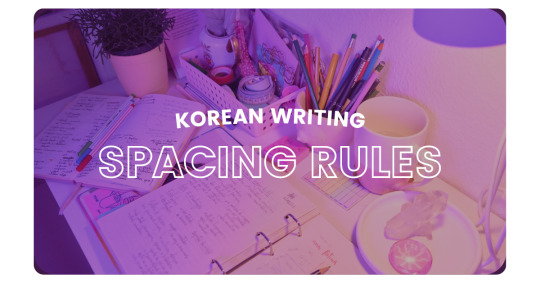
Writing in Korean can be quite complex when it comes to spacing (띄어쓰기), as it involves several factors like grammar, sentence structure, and even the type of words. In this article, I’ll share some of the most important rules I’ve learned with you.
1. Particles:
Korean uses particles to indicate grammatical relationships between words in a sentence. To ensure clarity, it is essential to separate these particles from the following words. Some commonly used particles in Korean include 은/는, 이/가, 을/를, 에, 에서, (으)로, 에게, 도, 와/과, and so on.
For example, in the sentence “저는 한국에서 떡볶이를 먹었습니다” (I ate Tteokbokki in Korea), there are three particles used: 는, 에서, and 를. To make it clear, it is essential to add spaces after each particle.
It is essential to note that particles are included as part of the preceding word. Therefore, particles are not standalone words and should be attached to the word they modify without spaces.
2. Independent Nouns:
In some sentences, there may be two or three nouns put together to form a noun phrase. In constructing such phrases, it is generally advisable to separate each independent noun with a space.
For example, “한국 음식” (Korean Food) and “경영 대학교” (Business University) both consist of multiple nouns that should be separated by spaces.
However, there are exceptions to this rule:
Compound Words: When words are combined to create a new meaning, they should be written without spaces. For example, “tear” in Korean is “눈물”, a compound word made up of 눈 (eyes) and 물 (water). This word should be written together as “눈물” without a space between them. The same applies to verbs such as “to visit,” which is “방문하다”, a compound word made up of “방문” (visit) and “하다” (to do).
Proper Nouns: If the noun phrase is a commonly used or official name, such “한국관광공사” (Korean Tourism Organization) or “국립중앙박물관” (National Museum of Korea), it is standard to write the entire phrase without spaces. Doing so makes it more easily recognizable as a specific entity or organization.
3. Person’s Name and Title
Korean personal names consist of a surname and a given name, both of which have independent meanings and can be used as separate words. Although it can be argued that they should be written separately, personal names are unique nouns, and Korean surnames are usually only one syllable, making them feel incomplete on their own. Therefore, it is customary to write personal names without spaces between the surname and given name.
For example, “Park Ji-min” is written as “박지민,” “Kim Min-seok” is “김민석,” and “Lee Min-ho” is “이민호,” all without spaces.
However, when titles or job names follow a personal name, they are separate units and should be written with a space between them.
For example: 박지민 씨 (Mr. Park Ji-min), 민수철 교수 (Professor Min Su-cheol), 김 의사님 (Doctor Kim) all have a space between the personal name and the title or job name.
4. Numbers and counters:
In Korean, spacing is used between every ten thousand when writing numbers. This means that if you have a number with five digits or more, you will use a space to separate the digits in groups of four.
For example:
이천이십삼 (2023)
구만 팔천칠백육십오 (98765)
일억 이천삼백사십오만 육천칠백팔십구 (123456789)
When it comes to combining numbers with counters, there are two cases to consider:
If you write the number in digits, there is no space between the number and the counter. For example, “1개” (one piece), “2번” (two times), and “3명” (three people) have no space between the number and the counter.
However, if you write the number in words, there should be a space between the written number and the counter. For example, “삼 학년” (third grade), “칠천 원” (seven thousand won), and “칠 개월” (seven months) have a space between the written number and the counter.
5. Word modifiers:
When a modifier (such as an adjective, verb, or adverb) modifies a word, it should be separated from the word by a space. This helps to clarify the relationship between the two words and make the sentence easier to read.
For example:
유나는 예쁜 여자예요 (Yuna is a pretty girl)
한국 와서 처음 먹은 음식 기억나요? (Do you remember the first food that you ate in Korea?)
저는 일을 잘 해요 (I do my job well)
All use spacing to separate the modifier from the word.
Additional Notes:
– It’s worth noting that there are certain grammatical structures in Korean that require specific spacing. For example, “(으)ㄴ 적이 있다” (have done in the past), “(으)ㄹ 수 있다” (can/be able to), “아/어 보다” (try doing) and so on. It’s important to pay attention to these spacing rules when learning Korean to ensure that your writing is accurate and clear.
– Finally, when using “이다” (to be) or “아니다” (to not be), it’s important to note that “이다” is written immediately after a noun, while “아니다” is written separately from the noun due to the particle. This is important to keep in mind when writing sentences that use these verbs.
For example:
학생입니다 (I’m a student)
학생이 아닙니다 (I’m not a student.)
The preceding explanation outlines my current understanding of the spacing rules when writing in Korean. However, I also want to point out that there might be some special cases or exceptions to these rules that I’m not aware of. So, if you have any experience with these special cases, I’d love to hear about it! Let’s share our knowledge and learn from each other.
🌸 🌼 🌻
Support me at: https://koreanlanguageloving.my.canva.site/
#Korean Language#Learn Korean#Study Korean#Hangul#korean langblr#Topik Writing#Korean Writing#Korean Topik#한국어공부중#한국어공부해요#한국어공부하기#한국어공부#한국어 공부#한국어#한국어수업#한국어 수업#한국어능력시험#Learning Tips#korean grammar
124 notes
·
View notes
Text

Free Character Writing and Practice Sheet PDF for Korean, Japanese, Chinese | Digital Download for Language Learning
This is a character writing & practice sheet set for languages like Korean, Japanese and Chinese. As a Korean learner myself, using sheets like these help me prepare for the TOPIK exam, and I decided to make some and share them with all! For free!
Language learning is a fun process and it becomes even more fun as you progress. I wish you the best luck on your language learning journey!
🔗 Link: https://peachystudiosco.gumroad.com/l/character-writing-sheet
#langblr#languages#korean#japanese#chinese#mandarin#cantonese#kanji#hanja#japanese resources#language learning#language resources#korean resources#chinese resources#free resources#printables#free printables#topik#jlpt#hsk#writing practice#foreign language
4 notes
·
View notes
Text
once again wondering why I registered for both TOPIK 1 and TOPIK 2
#hubris is the answer#can u imagine how relaxed I would be if I only had to take topik 1 tomorrow#but no I had to go 'y not both then 1 is gonna be a good fail save strategy'#bitch ure gonna need that fail switch#am looking forward to the graph task tho ngl#jassi rants#gonna be writing these dumb exams from 9:40 to 16:somth tomorrow rip my sanity
2 notes
·
View notes
Text
i shouldve been studying lmfao but i couldnt get that damn song out of my head since this afternoon
#i should be answering these topik mock tests my korean is getting rusty and i have class this saturday#but nooo instead attempt to write a gayass fic#priorities am i rite#this is modernsapphicism talking#ANYWAY#if it sucks then who posted that? that wasnt me that was patricia
0 notes
Text
I have to write an essay for korean class. I was given a lil graph talking about how much the average worker works and two lil notes about how worker stress decreases efficiency
And so here I am figuring out how to talk about like fucking, labor rights in korean
#immediately was like OH MAN TIME TO BRING UP JEON TAE-IL#I’m intentionally doing v little research bc this is supposed to prep me#For like. writing an essay on the TOPIK test#but I know a lot offhand so it’s just a matter of FUCK IDK THAT WORD#gigi.txt
1 note
·
View note
Text
📚 Coreano di Livello A1 - A2 ▶📝 In combo con lo Studio della Grammatica 🇰🇷 📌 ⚙️ Tanti Esercizi e Tracce Proposte per potenziare l'Abilità di Scrittura 🎯 ! 🌟 🔴 High Exposure to korean ✒️ ... 📖 with the Authentic Materials provided ✍️ in these korean Textbooks ✏️ and ↪ with the Writing Prompts assigned ▶📝
✅ at Dosoguanbookstore
#coreano#korean grammar#grammatica#scrittura#lingue straniere#lingue orientali#corea del sud#korean writing#토픽#korean topik#topik#korean vocabulary
0 notes
Text
These are my language learning timelines and how long I've studied to get to that level!
English: fluent C2 > about thirteen years. I started learning when I was 5 (in kindergarten). I got to this level by age 18, when I started working as a professional English - Burmese translator.
Korean: fluent TOPIK 6 level > eight years. I taught myself how to read hangeul at age 15 and achieved TOPIK level 6 in 23. It should be noted that I attended a language program in Korea for nine months to accelerate the process. I started from level 1 and ended in 4/5 in nine months.
Chinese: advanced HSK6 level > eleven years. I started learning chinese when I was 13 and now I'm 24. And no, my chinese ancestry didn't help because no one in my family speaks Chinese.
Japanese: Intermediate JLPT N3 level > nine years. Like Korean, I taught myself how to read hiragana and katakana at age 15 but I prioritized Chinese and Korean. It should be noted that I really struggled with Japanese and had to attend basic classes three times to get to an N5 level. And then twice more to get to N4.
I think this is important for all langblrs to realize! I am not "gifted" at all. I just started studying a bit earlier than y'all because I knew my life long interests are in language, literature and translation. I learned all these so that I could read books in their original language.
It should be noted that in Myanmar, I graduated high school at age 16/17. Since then, I've been attending a distance education university (before I dropped out in 2021 of course) and I've been working freelance or part time jobs. So this is an actual realistic timeline as an adult who also has a life outside of studying.
If you work full time, study full time or have responsibilities in your life that you have to prioritize, you might need to take a few years longer than me. You might even need to retake classes and fail a few tests. And it's okay.
I can't emphasize this enough so I will do this again and again: not being able to quickly learn language is not a failure on your part. Don't fall into ageist traps because you really do retain your brain functions well into your years. You can keep learning and keep improving as an adult. Look up neuroplasticity and stop listening to "polyglot" influencers.
Another thing I want to mention is in my last post, I wrote that language learning takes years and you'll just have to make these years bearable and I mean it. Just sitting down and studying for hours is annoying to me. So, I personally make it bearable by reading stories and translating songs or poems because that's what my brain likes. I like writing chinese characters but it's boring to just sit down and write them. So I write them while watching tv because I have adhd and I need to fidget anyway. My goal is to read books in their original languages so I read, read and read. You have to figure out why you want to learn these languages and see how you can make it bearable.
#also please put in your thoughts and additions in reblogs or tags! I love reading long rants#langblr#studyblr#100 days of productivity#japanese language#chinese language#chinese langblr#japanese studyblr#chinese studyblr#korean language#korean studyblr#long post
70 notes
·
View notes
Text

토픽II 쓰기.. ✍️ 😥 저는 할수있다-ㅏ고 싶지만 너무 어렵진 않아요!?? ㅠㅠ
'Korean Repair Shop' on youtube is super helpful for checking whether I'm thinking in the right direction, and they have a video for most past TOPIK questions. // Also random vietnamese korean-learners on facebook come in clutch with common phrases, don't let the lack of English throw you off from checking out their resources! // If you don't have a native speaker on hand to check your work for you, I'd really recommend at least letting GPT look over it (used with care of course) to check for awkward phrasing or alternative ways to write. I just use it's speech recognition so i don't have to type 😅
39 notes
·
View notes
Text
Langblr Introduction (updated ver.)
Hi, hi! i just wanna update my introduction hwhw.
about me:
Youngi (영이)
21+
she/her
Indonesia
ISTJ
social media: instagram | twitter/x
languages:
Indonesian (native)
English (intermediate)
Korean (TOPIK 6급)
Finnish (just start learning)
want to learn: chinese, japanese, dutch, spanish
interests:
reading books
watching variety shows and dramas
kpop fan (a fan of TVXQ!, XIA (Kim Junsu), Kim Jaejoong, Jukjae)
self-improvement
this blog:
i mostly post vocabulary sets i learned ._.
kor-id translation collections:
writing blog (in korean and indonesian):
#한국어#한국어 공부#공부계#한국어 공부하기#한국어 배우기#learning korean#study korean#studyblr#langblr#langblr introduction#langblr intro#learning languages#language#language stuff#language learning#language study#korean
12 notes
·
View notes
Text
So Let's Talk About Kinktober
I had a bit of a rough time by week four of kinktober and haven't posted since the 22nd. I promise those fics ARE going to be posted, but they'll most likely be posted after the 31st.
I have two time-constrained posts that have to meet a deadline of the 31st for challenges that I want/need to get through soon.
So basically: I'm extending kinktober by a week! Yay! It's been a bit difficult balancing my full-time job with studying for an exam I'm taking (TOPIK - Test of Proficiency in Korean if anyone is interested lmao) with also resting and relaxing and xyz other things, so I really just had to pause on kinktober for a while there.
The good news is, I have no plans for next weekend, and my evenings are mostly clear now as well. I expect I'll be able to do more writing this week than I have for the previous few weeks.
If this changes, I'll update again, but yep! Last week of kinktober will be posted as and when I have them finished, and sometimes that may mean multiple ao3 uploads at once!
I'm still closing my requests on the 31st, so if you want to request something, please send it through my asks :)
Thank you all for your patience!!
42 notes
·
View notes
Text
goals for 2024
2023 has been a very tumultuous year for me, for a variety of real-world reasons, and i wasn't able to reach a lot of my goals. in light of that, i want to list out the goals i have for 2024 and how i plan on reaching them as a way to keep myself responsible.
first of all, i have a number of language goals, where i would like to make advances in a variety of languages:
- i want to reach an hsk 6 level with my reading and writing. in order to reach this goal, i plan on reading two articles per day on dot, and two articles per week from TCB, and add terms i don't recognise to my TOFU deck, as well as write down example sentences using these vocab/grammar patterns, and go over them with my tutor. i also want to read the entirety of a cnovel in the original chinese.
- i want to reach a basic level in korean and kazakh. in order to do this, i plan on completing the mango korean course, and the first two units on the kazakh course. i also plan on completing through the topik 2/a2 level on lingory for korean.
- i want to work through the kurmanji textbook i've been using, and look for ways to continue learning on a more formal level, such as through online courses.
additionally, i have some other academic goals for uni i'd like to meet:
- i'd like to keep all my grades at or above 90% for my classes going forward. my biggest obstacle to this in 2023 was that i didn't want to get up early and actually go to class, instead watching the lectures afterwards from the recordings, and this made it harder for me to absorb information (since i usually take notes by hand while in class), as well as reduced my participation grade in that class. in order to do this, i plan on giving myself an 11:00 hard bedtime, at which point i have to turn off all my devices and lay down and at least try to go to sleep. also, i've chosen classes that are scheduled for later on in the day in the winter quarter, which should help with this.
- i want to start utilising office hours and study aids more frequently. i've occasionally used office hours, but i've never taken advantage of study aids, and while i don't think i necessarily need them to keep my grades up, i want to have time to go over class material and make it stick more firmly in my mind.
i also have some miscellaneous goals:
- i want to look for a penpal programme aimed towards international penpal connections, specifically for a chinese penpal, because one of the things i need to do more is actually write in chinese by hand to make characters stick in my muscle memory, rather than just relying on my computer/phone to choose the right character while writing.
- i want to write at least 20k of original fiction, and i'd like to plan out a novel at least at an outline level even if i don't manage to write it.
- i want to be more consistent about posting language/uni updates on tumblr, as a way to keep myself accountable for being more purposeful in my studies.
- i want to find student/interest clubs that are relevant to me and join them, and i'd like to be more involved with events and activities on campus.
that's everything i can think of! i hope that in 2024 i'll be able to meet these goals :)
14 notes
·
View notes
Photo
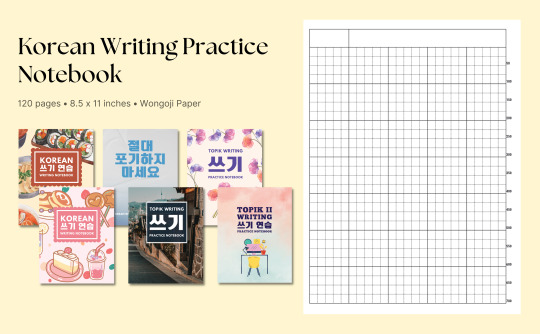
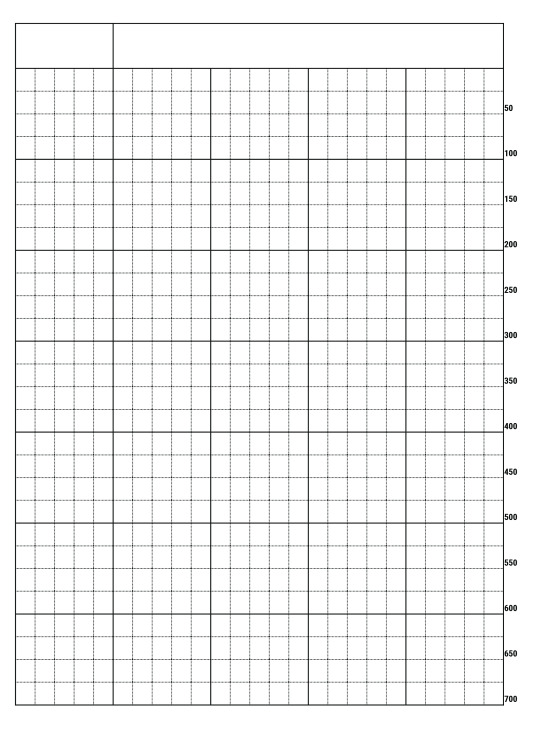
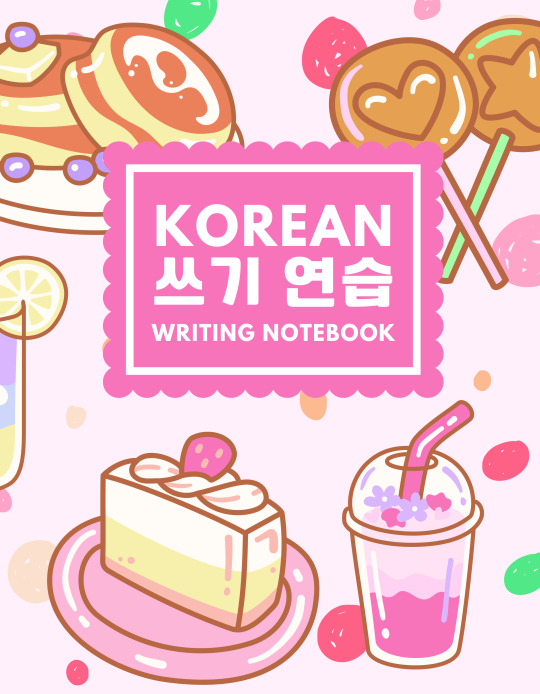

Korean Writing Practice Notebook
This Korean Writing Practice Notebook is a great choice for practicing Korean handwriting if you are learning Korean or preparing for the Topik test. There are 120 pages of Hangul Manuscript Papers, also known as Wongoji Papers. The pages are designed similarly to real Topik test papers. Therefore, this notebook will be useful for anyone who starts working on your Korean essay writing skills
A wonderful present for family and friends who learning Korean handwriting or preparing for Topik Test.
Product Details
Total 120 pages of Wongoji papers.
White Paper
Matte Finish Cover
Buy Here
Thank you for supporting me ❤️❤️❤️
#Korean Language#Korean Learning#Learn Korean#Korean Notebook#Korean Writing Notebook#Korean Writing Practice Notebook#Hangul#Topik#Topik Test#한국어단어#한국어 배우기#한국어배우기#한국어능력시험#한국어공부#한국어 공부#한국어공부중#한국어공부해요#한국어공부하기#Writing Notebook
6 notes
·
View notes
Text
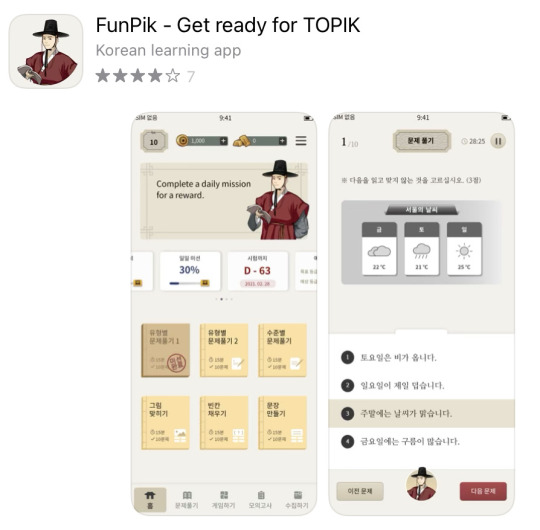
This is a really good app for TOPIK prep, or for people who just want a daily study app! It’s called FunPik and is free on both iOS & android!
PROS:
Mock tests (reading section only) for both TOPIK I & II with a built-in timer
Daily challenges; perfect if you just want to do a few minutes of studying without wasting time deciding what & how to study
3 different games: identify a photo, choose the missing word in a sentence, and unscramble a sentence (honestly the timer on these can make it pretty difficult, but it's a good goal to work towards)
Explanations!!! When you check which questions you got wrong, there's a short explanation about why the correct answer is correct (seriously, why doesn't every TOPIK app have this?)
The youtube channel...okay, technically not part of the app itself, but it links to the 펀픽 channel where you can watch short lectures about how to answer different questions and other study tips. The focused lectures are a more recent addition, so I hope they'll be adding more videos in the future~
Analysis of your progress, including how well you do on different types of questions, an estimation of how close you are to your target level, and how you spend your time in the app
Gameification for motivation~ Get those coins and study streaks! The coins are used to buy "historical relics" which gives you a random photo & description of various landmarks and things around Korea. Adds a little bit of history & culture learning!
CONS
I wish it had a friends list to add to the game aspect and be more competitive/supportive. You can see a ranking list of all users, but I don't care about random strangers lol
The sentence games are too hard for me (not enough time to think, need to be able to immediately answer if you want to finish/do well) and there's no way to adjust the level or turn off the timer. I don't know if the game levels change if you set your target TOPIK level lower
No listening section ㅠㅠ
No writing, but that’s kinda understandable since it'd need a person to score your writing
Overall, I highly recommend checking it out! If you're preparing for the TOPIK and need the extra nudge to study a bit more every day, this app would be perfect. And even if you aren't planning to take the exam anytime soon, this would be a quick & easy way to study during your commute or before bed!
114 notes
·
View notes
Photo
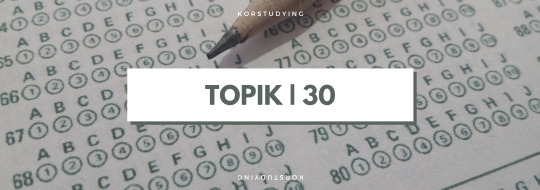
잃어버리다 - to lose
잡수시다 - to eat (honorific form of 먹다)
가져가다 - to bring
곳 - place
쓰다 - to write; to use
야구 - baseball
앞 - in front of
이용하다 - to use
여러 - several
연습하다 - to practice
들어가다 - to enter
색깔 - colors
네 - yes
부지런하다 - to be diligent
많이 - a lot of
All TOPIK 1 vocab on memrise
#Korean#Studyblr#Study#Koreanblr#Langblr#Learn#Language#Learning#Studying#Language Learning#Vocabulary#Vocab#Words#TOPIK#TOPIK 1
65 notes
·
View notes
Note
Hey could share some tips abt learning new Lang you seem to have good grasp by now and I m willing to start Korean so maybe some advice would really help I g.
Have a grt day :))
I would love to! My advice won't be too structured so please bear with me 😭💕
New Script
First things first your target language has a different script. Since you've written your ask in English I understand that you're familiar with the Roman script. Please understand this, when you're learning a language and it has a script you're not familiar with, drop everything and familiarise yourself with the script first. A lot of students tend to develop a tendency of relying upon the script they already know to be able to read the text of their target language(hereinafter mentioned as TL). I'm in my third year of studying Japanese. Japanese has 3 scripts. Students who didn't familiarise themselves with the Japanese scripts still rely on writing the pronunciations of words in English. The learning of the Korean script is not just limited to memorising the letters, but as far as I can remember, the positions of the letters also matter. Essentially, you need to know the script like the back of your hand. Since the Korean language has gained a lot of traction in the past few years, there are now a number of apps for you to practice writing the script and provides flashcards for you to retain the script.
Gather Study Material/Make a Study Plan
If you're planning on self studying, do extensive research, on YouTube, Tumblr, find other people who are learning the same TL as you are, ask them what resources they use. As far as a beginner is concerned, most platforms provide basic learning material for free. If you need to get a basic framework or a goal to work towards, look for the proficiency test of your language and if it is conducted in your country. For Korean it would be the TOPIK test if I'm not wrong. The lowest level is 1, highest 5. Jot down the syllabus or print it. And start researching on gathering the material to cover that syllabus. This way you won't feel like you're arbitrarily studying whatever you can get your hands on. It'll give you a goal to work towards. For TOPIK level 1, I believe you'll easily find free resources online.
Understanding Sentence Structure
Grammar structure that is whether your TL is a Subject+Object+Verb(eg. Japanese, Hindi, Korean) or a Subject+Verb+Object(eg. English, Chinese). If you already happen to know a language that has the same sentence structure as your TL, take that language as your base language to learn the TL.
Input vs Output
When you're learning a new language, there's two things happening. One is Input, the other is your Output. Input would include reading and listening and output would be writing and speaking. Please understand that it might be a while before you can fluently create output. When you're starting out, a great amount of input is needed to "create" output in your TL. And by create I mean being able to create sentences in your TL as opposed to creating a sentence in your native language and then translating it to your TL. Being able to intuitively, effortlessly create sentences, or think in a new language takes a LOT of input. Think of how long it takes babies to speak because they don't have a base language from which they can translate. They gather input for such a long time before they can string two words together. So don't feel disheartened when you sit down to write something in your TL but words just won't come to you. It's fine. Put your focus into gathering a lot of input.
Kind of Input to Look For
An important thing to consider when you're in your quest for gathering input, is to gather such input as would be useful to your level of understanding of the TL. Imagine if a lawyer started talking to a baby to increase the vocab capacity of the baby. it won't work. Find materials suited to your level. If you're a beginner read children's books, watch children's cartoons. The good thing about being an adult is that we can learn faster than a baby, so naturally we might progress on to intermediate level more easily than a kid but that doesn't mean we can skip the part where we have to read kid's books.
Overcoming the Intermediate Level Boredom/Lack of Motivation
The true problem arises when we're at a lower intermediate level. So now we know more than just the basics, but not enough to be able to understand our favourite shows or read the novels or comics we'd like to read. The solution is to remind yourself again, that lower intermediate level requires reading and listening to content of that very level. This is the one place I've seen so many students give up because language does get progressively harder from here. And most people who are relying purely on studying grammar and cramming vocab from a boring list tend to feel super burnt out. The solution is to read and especially read fiction. Fiction will naturally create interest in finding out what a particular word means. I've never managed to learn vocab from a list. It's tedious, boring and I always run the risk of ending up hating my TL. So read, and always read the stories suited to your level of understanding.
Same goes for listening. Immerse yourself in podcasts, youtube channels of your TL. Again at the level that suits you. Being able to understand something in your TL gives a confidence boost and motivates you to study more to be able to understand even more complex grammar, which is why I'm focusing so much on gathering input that is suited to your level of understanding of the TL.
This got a bit too long than I had planned😅 I hope this helps. I might add something later on. I'd love it if other langblrs would like to add to this.
Learning a new language is soooo exciting but you must MUST know that it requires a tremendous amount of patience. When you're starting out and feel frustrated that you're still not able to understand movies or books in your target language, remind yourself that you're the equivalent of a 6-7 year old student when you're studying the language and be kind to yourself as you would be to a kid. I hope I was able to help you out, sending all the love for your language learning journey💕
#langblr#a guide to language learning#how to study a new language#studyblr#studyspo#study community#langblr community#japanese langblr#hangeul#language#languages
7 notes
·
View notes
Note
Hey, I'd like to know how you teach yourself korean?🙃
안녕! :)
Well ofc it depends on the way you generally like to study (you can try different methods and see which one works better for you if you're still unsure). What I did generally works for learning languages in general (at least for me), but yeah.... (there are some different approaches in this masterpost)
First of all I learnt hangul, then moved onto basic grammar sentences/structure and vocabs... daily stuff mostly, like a kid. And tried to practice writing (both on computer and handwriting) while exercising (relying on Papago too). My resources were/are langblrs on here like @bieups @a-pop-of-korean (TY! Their resources are organized also by levels which is so useful -despite I tend to wander at times lol but WHATEVER) and some others I cannot remember but will try to add (or you can check my reblogs anyway under the tag #ref) and grammar videos on youtube in ENG-KOR or (more recently tho) KOR with ENG/KOR subs. TBH I started with a very basic yt course in Italian for free which offered also explanations by natives/people living in Korea for years + exercises.
Anyway when studying grammar, I also take notes actively on paper (I have a bunch of notebooks for grammar and vocabs or other stuff that may be useful -I'm personally badly organized but you can divide notebooks according on your needs like one for exercises, another for grammar, one for vocabs, one for music and so on).
I used to follow a Memrise course (which I totally should start doing again): I found this website/app to be very good for me personally when it comes to learn languages (I studied Russian as well on there). I'm not a Duo fan: their course (especially the Korean one) is not well organized imo... Memrise has good vocabulary but also natives short videos useful for pronunciation/listening (there are many courses there, you can choose any you rather... I think there's a Topik -Korean language exam- one too). I add to this (when I can, that's why I'm lacking a bit in this skill) watching Korean videos on YT (information/news, interviews, lives, tv shows, cooking/recipes videos, or shows like Going Seventeen and Run BTS...) and listening to podcasts (both on yt and spotify) and Kpop (translating songs -some can be found online already translated, also on here ofc which you can use both to learn directly and to check if you did your translation well).
I read Korean texts, even more if from natives (I joined Weverse for example for listening too, but also on here I try to read as much as I can). The only books I bought myself are these two in the pic below (and I bought them on Amazon for like around... 30 euros both? Idr sorry). The visual dictionary has a bit of grammar and general infos here and there too but I admit I am not using it as much as I tought: I learn vocabs more often through sentences/music or texts. The Folktales book instead is like my fav thing rn as it has KOR&ENG texts + vocabulary lists and also exercises/comprehension tests at the end of each story + Korean culture notes that are so very cool. I can read Korean (and also listen: there are audios online for each story) and practice all at once (I also write summaries of those folktales and it's good for fixing certain idiomatic expressions/words too). Disclaimer: it doesn't have much for beginners TBH so wait a little before buying it (if you are thinking about this chance ofc).
I think that to learn a language, one needs to understand the culture and traditions (history/development, celebrations, dishes and how they originated too, hot takes/povs on stuff) of the country speaking it as well so I've been trying to learn about this too. And on this matter I find very useful to watch also videos of Italian youtubers living in Korea (a better pov for me since it's by people who were basically raised with my same habits and traditions, at least for most part).
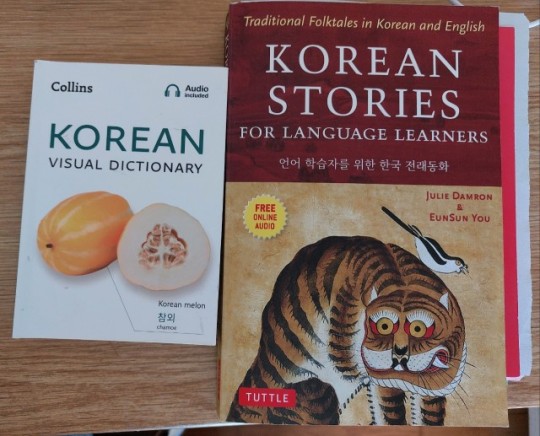
What else...? Well, I've been writing daily a diary on here for more than a year now (mostly to practice and collect resources) and whenever I get the chance, I try to put myself out there and send asks or reply to people's posts or anything in Korean (ofc to langblr/studyblr/people that know the language LOL -and yeah I'm ANNOYING but... yeah). The only way to learn is to try and make mistakes, hopefully someone will answer me and/or correct me :P
OFC if you can join a proper course or find an online teacher/study buddy on some good app or on here too (@booksbluegurl was up to something, not sure how it ended TBH), probably that would help you better. Interactions are so fundamental, as they help us think in another language more easily and more often imo (and Korean grammar works totally differently from English or Italian, we need to think in a different way when expressing ourselves: "I do this" VS "I this do", eg.). But if you are uncomfortable, take your time by focusing on your learning process... the rest will come with time :)
And when you feel okay to, talk out loud in Korean or read out loud: it makes a huge difference as it helps you fix words in your mind and realize where you lack so to work better on that (it's not that easy to pronounce every word/combination correctly at first, I often find myself having to repeat some sentences more than once to be able to say them "decently").
Best of luck on your journey~
3 notes
·
View notes